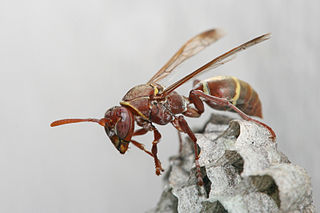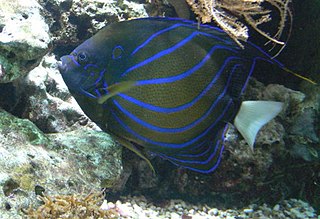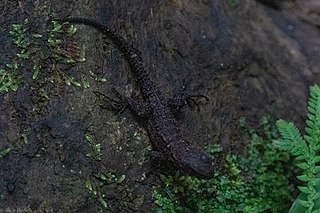
The white perch is not a true perch but is a fish of the temperate bass family, Moronidae, notable as a food and game fish in eastern North America. In some places it is referred to as "Silver Bass".

Tarentola is a genus of geckos, commonly known as wall geckos.

Crappies are two species of North American freshwater fish of the genus Pomoxis in the family Centrarchidae (sunfishes). Both species of crappies are popular game fish among recreational anglers.

The white crappie is a freshwater fish found in North America, one of the two species of crappies. Alternate common names for the species include goldring, silver perch, white perch and sac-a-lait. USS Goldring is named for the fish. The genus name Pomoxis refers to crappies' sharp operculum, while the species name annularis means 'having rings', i.e., it has vaguely vertical bars on the body.

The Polistinae is a subfamily of eusocial wasps belonging to the family Vespidae. They are closely related to the wasps and true hornets of the subfamily Vespinae, containing four tribes. With about 1,100 species total, it is the second-most diverse subfamily within the Vespidae, and while most species are tropical or subtropical, they include some of the most frequently encountered large wasps in temperate regions.

The bluering angelfish, also known as the Annularis Angelfish and the Blue King Angelfish, is a species of marine ray-finned fish, a marine angelfish belonging to the family Pomacanthidae. It is member of the genus Pomacanthus, composed of large marine angelfish.

Orbicella annularis, commonly known as the boulder star coral, is a species of coral that lives in the western Atlantic Ocean and is the most thoroughly studied and most abundant species of reef-building coral in the Caribbean to date. It also has a comprehensive fossil record within the Caribbean. This species complex has long been considered a generalist that exists at depths between 0 and 80 meters that grew into varying colony shapes in response to differing light conditions. Only recently with the help of molecular techniques has O. annularis been shown to be a complex of at least three separate species. Those species are divided into O. annularis, O. faveolata, and O. franksi. This coral was originally described as Montastraea annularis.

Enyalioides annularis, known commonly as the ringed manticore or the ringed spinytail iguana, is a species of lizard in the family Hoplocercidae. The species is endemic to northwestern South America. Little is known of its lifestyle.
Lipoatrophia annularis is a skin condition affecting primarily women, characterized by the loss of subcutaneous fat in the upper extremity.

Planolites is an ichnogenus found throughout the Ediacaran and the Phanerozoic that is made during the feeding process of worm-like animals. The traces are generally small, 1–5 mm (0.039–0.197 in), unlined, and rarely branched, with fill that differs from the host rock.

Polistes annularis is a species of paper wasp found throughout the eastern half of the United States. This species of red paper wasp is known for its large size and its red-and-black coloration and is variably referred to as a ringed paper wasp or jack Spaniard wasp. It builds its nest under overhangs near bodies of water that minimize the amount of sunlight penetration. It clusters its nests together in large aggregations, and consumes nectar and other insects. Its principal predator is the ant, although birds are also known to prey on it. Unlike other wasps, P. annularis is relatively robust in winter conditions, and has also been observed to store honey in advance of hibernation. This species has also been used as a model species to demonstrate the ability to use microsatellite markers in maternity assignment of social insects.
Nectamia annularis, also known as the tailring cardinalfish, is a marine fish belonging to the family Apogonidae or also called cardinalfishes.
Cyclophora annularis is a moth in the family Geometridae. It is found in Brazil.

Pterolophia is a genus of longhorn beetles of the subfamily Lamiinae, containing the following species:

Orbicella is a genus of stony corals in the Merulinidae family. The Orbicella species complex comprises three sister species, namely Orbicella faveolata, Orbicella annularis and Orbicella franksi, all of which are shallow-water, zooxanthellate species and are native to the tropical western Atlantic Ocean, the Caribbean Sea and the Gulf of Mexico.
Bledius annularis, or ringed borrow rove beetle, is a species of spiny-legged rove beetle in the family Staphylinidae. It is found in North America.

Chaenogobius annularis, the fork-tongued goby, is a species of goby from the subfamily Gobionellinae which is found in the brackish waters of temperate eastern Asia. It is the type species of the genus Chaenogobius.

Tarentola annularis, also known as the white-spotted wall gecko or ringed wall gecko, is a species of gecko. It is native to northern Africa.

The annular sea bream is a species of seabream belonging to the family Sparidae.














